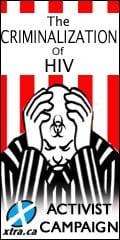
Credit: Ken Bosem illustration
The Canadian AIDS Treatment Information Exchange (CATIE) is hosting a series of public forums in cities across Canada in March that will examine the criminalization of HIV nondisclosure. CATIE, in partnership with the Canadian HIV Legal network and in conjunction with AIDS service organizations across the country, is paying for the events with grant money from the Public Health Agency of Canada.
“We talk about the politics of sex and sexual identity and gender in a way that courts and law doesn’t really understand and that people in society have only a sort of simpleton view of,” says Glenn Betteridge, forum moderator (except in Quebec) and legal and policy researcher working in health and human rights. “This tour is a good idea because people across Canada need information on what is happening around the criminal law and HIV.”
In 1998 the Supreme Court of Canada ruled that you could be charged with aggravated assault for failing disclose your HIV-positive status to a sex partner before having unprotected sex. Since then an increasing number of HIV-positive people, including many gay men, are being charged and convicted of violent offences ranging from aggravated sexual assault to murder.
It is morally dubious to deliberately expose a sex partner to a potentially lethal virus but a growing chorus of activists and researchers are saying HIV criminalization is fraught with injustice. They argue variously that criminalization hampers HIV-prevention efforts, fans the flames of HIV stigma, is rooted in misinformation and hysterical fear, puts the responsibility to protect sexual health entirely and unfairly on the shoulders of people living with HIV, turns gay men against each other and serves only to further victimize poz people.
Click here to find out how you can take action
But Betteridge says there remain disparate viewpoints, even within gay communities, about the best way to handle failure to disclose allegations.
“We almost talk about those things in a utopian aspirational way,” he says. “The idea that people living with HIV can have unprotected sex and face no consequences because the other parties should be looking out for themselves, asserting that as a human right, is tenuous.”
Betteridge says there may also need to be some remedy for those who become HIV positive after having unprotected sex when they simply don’t believe they have the free agency to refuse. What about those who honestly don’t feel they can insist on safer sex?
To Betteridge’s mind there is a struggle between what ought to be and what is. So, he says, he hasn’t yet made up his mind about criminalization.
“I am not sure,” he says. “It’s an issue I struggle with. I need to have my viewpoint more informed by those people who are feeling this profoundly to decide where I think the truth lies in this.”
Betteridge says he hesitates to publicly share a complete picture of his personal view because he wants to function as an impartial moderator and facilitator in the forums.
“We still have assertions on both sides that criminalization is both good and bad for a range of reasons and not a lot of evidence,” he says.
What if you are personally caught in a nondisclosure conundrum? Betteridge advises anyone who has been charged with a violent crime because of failure to disclose allegations to get a good criminal lawyer.
“The Canadian HIV/AIDS legal network and the HIV/AIDS legal clinic Ontario have been working with lawyers on strategies and approaches to develop really strong defences,” he says.
Should you call the cops if you think someone may be deliberately infecting others with HIV?
Betteridge says you should contact public health authorities, but stops short of advising you not to call police.
“What goes around comes around,” he says. “There’s this tide of criminalization that seems to be rolling along and you might get caught up in it yourself. Sex and sexual relations are really complicated so you could see yourself at a certain point in life not disclosing. There are often criminal acts in the essence of HIV transmission. To criminalize all the complexity in all those acts, be careful what you ask for.”

 Why you can trust Xtra
Why you can trust Xtra


